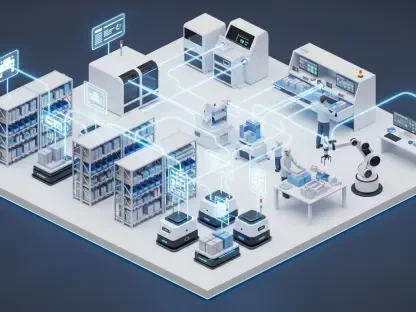Madrid’s healthcare system is a bustling network of hospitals, clinics, and pharmacies that demand precision and efficiency. With the recent introduction of advanced automation solutions, such as the one implemented by Dematic for Grupo Servicio Móvil, the landscape of healthcare logistics is undergoing a significant transformation. This article delves into how these advancements are set to revolutionize the industry, offering insights into the technologies involved and the impact on service delivery. Automation has become a cornerstone in modern logistics, particularly in the healthcare sector, where the timely delivery of supplies can be a matter of life and death. Grupo Servicio Móvil’s recent adoption of an AutoStore system designed by Dematic illustrates the transformative potential of automation in this high-stakes field.
The Role of Automation in Healthcare Logistics
Automation plays a pivotal role in addressing the unique challenges faced by healthcare logistics. The need for precise inventory management and timely delivery of medical supplies can be daunting in a manual system. Automated solutions streamline these processes, reducing the risk of human error. By employing automated storage and retrieval systems, healthcare providers can ensure that critical supplies are always available, enhancing patient care.
In Madrid, Grupo Servicio Móvil’s adoption of Dematic’s AutoStore system exemplifies this shift. The system’s ability to handle thousands of bins in a compact space demonstrates its efficacy. This integration not only optimizes space but also increases operational efficiency, which is crucial for healthcare facilities that cannot afford delays or stockouts.
Moreover, the automation provided by Dematic revolutionizes the way Grupo Servicio Móvil approaches logistical challenges. Automated systems significantly reduce the workload on human staff, allowing them to focus on more critical tasks that require human judgment and expertise. This reduction in manual labor also minimizes errors in inventory management and order fulfillment, which are critical in healthcare settings where the accuracy of medical supply counts can directly affect patient outcomes. By streamlining operations, Grupo Servicio Móvil can ensure that the healthcare providers they support in Madrid receive their needed supplies promptly and accurately.
Enhancing Operational Efficiency Through Automation
Operational efficiency in healthcare logistics is vital for the smooth functioning of medical facilities. Automated systems significantly enhance this efficiency by speeding up sorting and retrieval processes. For instance, the AutoStore system deployed by Dematic incorporates carousel ports and robots that work seamlessly to fulfill orders quickly and accurately, minimizing the turnaround time. Real-time data tracking integrated into the system offers a clear view of inventory, enabling better planning and faster response times to sudden changes in demand, which are common in the healthcare sector.
Moreover, the use of advanced software to manage these automated systems ensures optimal performance. Real-time data tracking and analytics help in monitoring inventory levels, predicting demand, and planning for contingencies. This level of efficiency is particularly beneficial in emergencies where timely access to medical supplies can save lives. The smooth integration of real-time data analytics into these systems allows healthcare logistics providers like Grupo Servicio Móvil to anticipate and respond to shortages before they affect patient care, thereby maintaining continuous operations even under pressure. This capability to predict and manage supply levels with precision is a critical advantage in the unpredictable environment of healthcare logistics.
Space and Energy Optimization With Automated Systems
One of the standout features of automated logistics solutions is their ability to optimize space and energy usage. In densely populated cities like Madrid, where real estate costs are high, the compact design of systems like AutoStore is a significant advantage. These systems can store a large number of items in a minimal footprint, making them ideal for healthcare facilities with limited space. This space optimization translates into cost savings and allows for a more efficient allocation of valuable hospital space, potentially freeing up areas that can be used for other crucial activities, such as patient care.
Energy efficiency is another critical aspect of these systems. Automation solutions often feature regenerative energy capabilities, using the energy generated by robots to power other units. This not only reduces energy consumption but also lowers operational costs. In a sector where budget constraints are common, such savings can be redirected towards improving patient care. The reduction in energy consumption also aligns well with global sustainability goals, a factor increasingly important for modern enterprises. For Grupo Servicio Móvil, the energy-efficient design of the AutoStore system means long-term savings and a smaller environmental footprint, which is a crucial consideration for forward-thinking organizations.
Scalability and Adaptability in Healthcare Logistics
The dynamic nature of healthcare logistics necessitates scalable and adaptable solutions. As the demand for medical supplies fluctuates, automated systems must be able to scale up or down accordingly. The modular design of systems like AutoStore allows for easy expansion, accommodating increased storage needs without significant overhauls. This flexibility ensures that logistics providers can meet the varying demands of different healthcare facilities, making the supply chain resilient to sudden changes. In Madrid, where healthcare needs can be unpredictable, having such a scalable system is an invaluable asset.
For Grupo Servicio Móvil, scalability was a crucial factor in their partnership with Dematic. The ability to seamlessly integrate additional modules ensures that their logistics operations can grow in tandem with the demands of Madrid’s healthcare system. This adaptability also means that the logistics provider can stay ahead of technological advancements, integrating new features and improvements as they become available. This forward-thinking approach enables Grupo Servicio Móvil to maintain high standards of service while continually improving operational efficiency. The ability to adapt quickly to new challenges and integrate advancements in automation technology ensures that they remain at the forefront of healthcare logistics.
The Future of Healthcare Logistics in Madrid
Operational efficiency in healthcare logistics is essential for the effective operation of medical facilities. Automated systems greatly improve this efficiency by accelerating sorting and retrieval processes. For example, Dematic’s AutoStore system uses carousel ports and robots to fulfill orders quickly and precisely, cutting down turnaround times. This system’s real-time data tracking offers clear insights into inventory, aiding in better planning and quicker responses to unexpected changes in demand, which are frequent in the healthcare industry.
The use of advanced software to manage these automated systems further ensures optimal performance. Real-time data tracking and analytics are crucial for monitoring inventory levels, forecasting demand, and planning for emergencies. This efficiency is particularly valuable in urgent situations where immediate access to medical supplies can be life-saving. The smooth incorporation of real-time data analytics into these systems allows healthcare logistics providers, like Grupo Servicio Móvil, to foresee and address shortages before they impact patient care. This ability to predict and manage supply levels accurately is a significant advantage in the unpredictable world of healthcare logistics.









